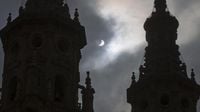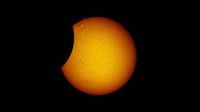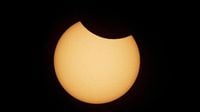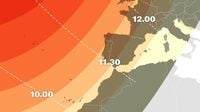On Saturday, March 29, 2025, Spain will witness the first solar eclipse of the year, a much-anticipated astronomical event that will be visible across the country. This partial eclipse will occur on a Saturday morning, coinciding with favorable weather conditions expected to allow millions of viewers to experience the phenomenon. The maximum visibility will occur around 11:40 AM in Madrid, with slight variations across the territory.
During this event, approximately one-third of the Sun's surface will be obscured by the Moon, creating a stunning visual spectacle. The eclipse will be observable for nearly two hours, beginning at around 10:48 AM in the Canary Islands and between 10:40 AM and 11:00 AM on the mainland. This makes it an ideal opportunity for both seasoned astronomers and the general public to engage with this celestial occurrence.
Experts emphasize the importance of safety when observing the eclipse. Directly looking at the Sun without proper protection can lead to serious eye injuries, including permanent damage. Therefore, only approved eclipse glasses or indirect projection methods should be used. Homemade solutions like radiographs or sunglasses are not safe and can increase the risk of harm.
The magnitude of the eclipse will vary across Spain. For instance, A Coruña will experience a maximum obscuration of 43% at 11:40 AM, while Palma de Mallorca will see only 20% by 11:45 AM. The eclipse will begin in the mid-North Atlantic and travel across various regions, including northern Africa, most of Europe, and parts of the Americas.
In Spain, the best locations to view the eclipse will be in the northwest, where the obscuration will be most significant. However, the visibility will depend heavily on local weather conditions. As of now, forecasts indicate a high probability of clear skies in many areas, but the northern regions may face cloud cover that could hinder visibility.
In La Rioja, for example, viewers can expect just over 20% of the Sun's surface to be obscured. The peak of the eclipse in this region will occur at 11:45 AM, with the event starting at 10:53 AM and concluding around 12:39 PM. Local experts suggest that unless the Sun is significantly obscured, it may be difficult to notice the change in brightness.
Looking ahead, this partial eclipse serves as a precursor to more dramatic celestial events. Spain is set to experience two total solar eclipses in 2026 and 2027, along with an annular eclipse in 2028. The total eclipses will provide an even more breathtaking experience, as the Moon will completely cover the Sun, plunging daylight into darkness for a brief period.
On August 12, 2026, a total solar eclipse will cross the entire national territory, allowing millions to witness the awe-inspiring sight of the Sun's corona. This event will be particularly memorable, as it will occur during the evening hours, creating a unique atmosphere.
In preparation for the March 29 eclipse, many astronomical associations across Spain are organizing public viewing events. These gatherings will provide the public with safe viewing tools, educational materials, and opportunities to learn more about the science behind solar eclipses. For instance, the Planetarium of Madrid will host a public activity starting at 10:30 AM, while various parks and observatories will set up telescopes and projection equipment for safe viewing.
In addition to the Planetarium, other public observation events will take place in locations such as the Casa de las Ciencias in A Coruña and the Escuela de Marina in Gijón. These activities will not only facilitate safe viewing but also educate attendees on how to build their own indirect viewing devices at home.
As the eclipse approaches, many are reminded to secure their eclipse glasses early, as these are in high demand and can sell out quickly. Approved glasses must comply with the ISO 12312-2 standard, ensuring they provide adequate protection against harmful solar radiation. Prices typically range from €3.95 to €8.90 per unit, with discounts available for bulk purchases.
In summary, the solar eclipse on March 29, 2025, presents a remarkable opportunity for viewers across Spain to engage with an extraordinary natural event. With proper safety precautions and clear skies, this celestial spectacle promises to be a memorable experience for all involved. As anticipation builds, many are already looking forward to the even more spectacular total eclipses on the horizon, marking a thrilling time for astronomy enthusiasts.









